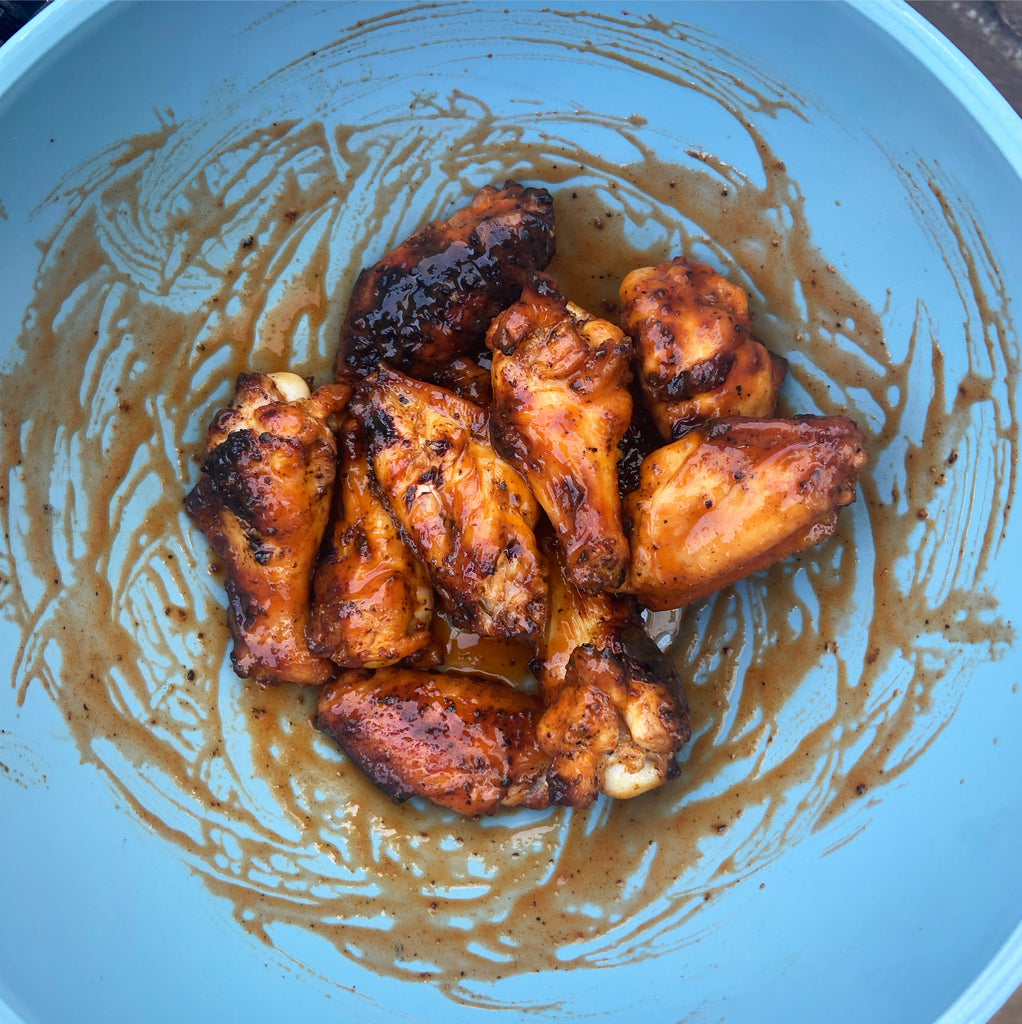Dry Rub or Marinade: What's Best for Grilling?

Dry Rub or Marinade? Let's Dive In!
As a Grillhead you always want to maximize the flavor to your meats before and after they hit the grill. Two popular options are dry rub or marinade. But which technique should you use and when? This guide breaks down the pros and cons of dry rubs or marinades for various types of goodies you're going to throw on the grill.
Poultry

For chicken, turkey, and other birds, dry rubs reign supreme. Rubbing a blend of spices directly onto the skin helps create an incredibly crispy, flavorful exterior without adding excess moisture. The sugar content also promotes lovely browning and caramelization.
Some of our favorite dry rubs for poultry include:
- Cajun seasoning with paprika, garlic, onion, cayenne pepper, and more
- Jerk seasoning with allspice, thyme, garlic, and chili peppers
- Memphis-style with brown sugar, paprika, garlic, and cumin
One special poultry item we like to highlight are Trashed Wings. These wings are coated in a dry rub seasoning like our Queen Bee before being deep fried multiple times for maximum crunch. The rub helps seal in moisture while providing big flavor in every bite. Trashed Wings are always a crowd favorite!
When using dry rubs on poultry, it's important to evenly coat all surfaces. You can either sprinkle it directly on the meat or mix the rub with a small amount of oil first to form a paste. Apply the night before for maximum flavor infusion, or just an hour or two before grilling if you're short on time.
For whole chickens and turkeys, get under the skin to cover the breast and thighs too. Flip and rotate during grilling to prevent burning. Brush with a glaze in the last 5-10 minutes for a touch of sweetness if desired.
If you prefer more tenderizing power, marinades do work well for boneless chicken breasts. Opt for buttermilk-based marinades to really boost the juiciness.
Beef

For steaks, burgers, and other beef cuts, dry rubs also work extremely well. The spices form a tasty crust while allowing you to still achieve that quintessential sear. Make sure to balance savory, sweet, and spicy elements in your beef rub.
Good beef dry rub combos include:
- Black pepper, kosher salt, brown sugar, paprika, garlic powder
- Chili powder, cumin, brown sugar, cayenne, oregano
Apply the dry rub just before grilling - no need to let it sit. Press the spices into the meat with your fingers to ensure they adhere. Flip the steaks 2-3 times during cooking for an even coating.
While marinades can help tenderize tougher beef cuts like flap meat or brisket, we still prefer dry rubs here. You can use dry rubs are your marinate if desired. Tenderizing and marinating tough cuts of meats the night before your grill goes a long way in the final product. Then add your dry rub. It can be a great combo! The drier exterior helps form a better sear which is key for flavor.
If you want to add a sauce to steaks or burgers, wait until the very end of the grill. Brush on barbecue sauce, chimichurri, or browned butter as a finisher.
Pork

Pork takes well to both dry rubs and marinades. For quick-cooking pork chops and tenderloin medallions, a straight dry rub is all you need. The rubs bring out the meat's natural sweetness.
For larger roasts and tougher cuts like shoulder, marinating for several hours adds both flavor and tenderness. You can apply a dry rub after marinating to form a spiced crust.
Some excellent pork rub combos:
- Brown sugar, mustard powder, paprika, garlic, onion, thyme
- Coriander, cumin, cinnamon, brown sugar, cayenne
When using a marinade, reserve some to brush on the pork while grilling. This helps prevent drying out. For pork, a marinade that balances sweet, savory, and acidic components works wonders in enhancing flavor and tenderness. Here's a versatile and delicious pork marinade recipe:
Ingredients:
- 1/2 cup apple cider vinegar
- 1/4 cup soy sauce
- 1/4 cup olive oil
- 1/4 cup honey or brown sugar
- 2 tablespoons Dijon mustard
- 3 cloves garlic, minced
- 1 teaspoon ground black pepper
- 1 teaspoon salt
- 1 tablespoon chopped fresh rosemary or 1 teaspoon dried rosemary
- 1 teaspoon smoked paprika (optional for a smoky flavor)
- 1/2 teaspoon red pepper flakes (optional for heat)
This marinade's combination of flavors complements pork's natural richness, while the acid in the vinegar and mustard helps tenderize the meat. Adjust the sweetness or spiciness according to your preference by modifying the amount of honey/brown sugar or red pepper flakes.
Other Proteins
For fish and shellfish, marinades work better than dry rubs. The acidic marinades help tenderize the delicate proteins. Quick marinade times of 30 minutes or less are ideal.
With lamb, both dry rubs and marinades can work well depending on the specific cut. Marinate chops and legs for tenderness and use dry rubs on quick-cooking medallions.
For game meats like venison, dry rubs help counteract any gaminess in the flavor while forming a tasty crust. Soaking in milk can help reduce the gaminess of the meat - which is what some people like though.
Vegetables also benefit from dry spice rubs. Try chili powder, cumin, garlic, and brown sugar on zucchini or eggplant. Sparsely coat portobello mushrooms with smoked paprika, oregano, and olive oil.
Conclusion
While both dry rubs and marinades have their place in grilling, we firmly believe dry rubs are the best choice in most cases. The concentrated flavors and textural enhancement can't be beat. Whip up your favorite spice blend and get ready for the ultimate grilled meats this season. Or just use ours!
Ready to give some Damn Good Meat Rubs a try on your next batch of Trashed Wings? Shop now!
